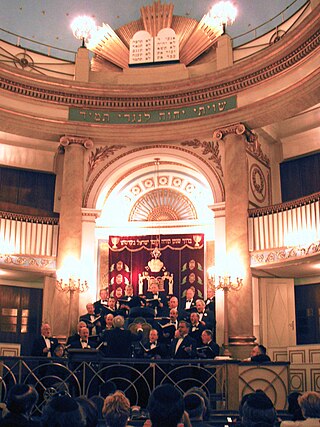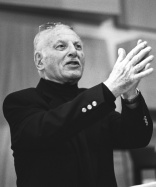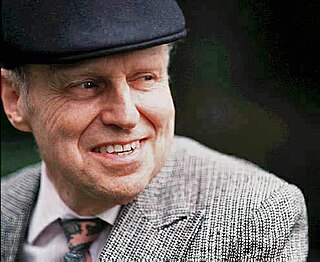
The Jewish Theological Seminary (JTS) is a Conservative Jewish education organization in New York City, New York. It is one of the academic and spiritual centers of Conservative Judaism and a major center for academic scholarship in Jewish studies. The Jewish Theological Seminary Library is one of the most significant collections of Judaica in the world.

The United Synagogue of Conservative Judaism (USCJ) is the major congregational organization of Conservative Judaism in North America, and the largest Conservative Jewish communal body in the world. USCJ closely works with the Rabbinical Assembly, the international body of Conservative rabbis. It coordinates and assists the activities of its member communities on all levels.

A hazzan or chazzan is a Jewish musician or precentor trained in the vocal arts who helps lead the congregation in songful prayer. In English, this prayer leader is often referred to as a cantor, a term also used in Christianity.
Michael Isaacson is a composer of Jewish synagogue music, and one of the originators of the Jewish camp song movement. His camp songs were often written and premiered on the same day, defining the camp music movement in the 1960s, and having been cited as a key influence by modern Jewish pop stars such as Debbie Friedman and Craig Taubman.

Congregation Baith Israel Anshei Emes, more commonly known as the Kane Street Synagogue, is an egalitarian Conservative synagogue located at 236 Kane Street in Cobble Hill, Brooklyn, New York City, United States. It is currently the oldest continuously operating synagogue in Brooklyn.

Naftali Herstik is a well known chazzan (cantor) and teacher. He was born in Salgótarján, Hungary and came with his family to Israel at the age of three. He is descended from a long line of cantors and Rabbis, and was recognized as a cantorial prodigy from his early childhood, singing as a teen in concerts with Cantor Moshe Koussevitzky.
Robert Strassburg was a leading American conductor, composer, musicologist and music educator of the twentieth century. His studies in music were completed under the supervision of such leading composers as Igor Stravinsky, Walter Piston and Paul Hindemith, with whom he studied at Tanglewood. His formal academic studies were completed at the New England Conservatory of Music and Harvard University, where he obtained a fellowship in composition. He also completed a doctorate in Fine Arts at the University of Judaism in Los Angeles. As a musicologist, Dr. Strassburg is regarded as a leading authority on the compositions of the composer Ernest Bloch.
Jewish music is the music and melodies of the Jewish people. There exist both traditions of religious music, as sung at the synagogue and domestic prayers, and of secular music, such as klezmer. While some elements of Jewish music may originate in biblical times, differences of rhythm and sound can be found among later Jewish communities that have been musically influenced by location. In the nineteenth century, religious reform led to composition of ecclesiastic music in the styles of classical music. At the same period, academics began to treat the topic in the light of ethnomusicology. Edward Seroussi has written, "What is known as 'Jewish music' today is thus the result of complex historical processes". A number of modern Jewish composers have been aware of and influenced by the different traditions of Jewish music.
Benzion Miller is a cantor, schochet and mohel, much like his father, Aaron Daniel Miller. He was born in a displaced persons camp in Fernwald, Germany.
The Jewish art music movement began at the end of the 19th century in Russia, with a group of Russian Jewish classical composers dedicated to preserving Jewish folk music and creating a new, characteristically Jewish genre of classical music. The music it produced used Western classical elements, featuring the rich chromatic harmonies of Russian late Romantic music, but with melodic, rhythmic and textual content taken from traditional Jewish folk or liturgical music. The group founded the St. Petersburg Society for Jewish Folk Music, a movement that spread to Moscow, Poland, Austria, and later Palestine and the United States. Although the original society existed formally for only 10 years, its impact on the course of Jewish music was profound. The society, and the art music movement it fostered, inspired a new interest in the music of Eastern European Jewry throughout Europe and America. It laid the foundations for the Jewish music and Klezmer revival in the United States, and was a key influence in the development of Israeli folk and classical music.
Louis Harry Danto was a lyric tenor and cantor. He was acclaimed for his cantorial music, concert appearances and recordings of Italian, Russian, and French opera repertoire. Danto performed throughout North America, Europe and Israel, and recorded 24 solo albums.

Herman Berlinski was a German-born American composer, organist, pianist, musicologist and choir conductor.
Hazzan Abraham “Abe” Lubin is a London-born American Conservative Jewish Hazzan and former President of the Cantors Assembly, who is the cantor emeritus at Congregation Beth El in Bethesda, Maryland.
The Milken Archive of Jewish Music is a collection of material about the history of Jewish Music in the United States. It contains roughly 700 recorded musical works, 800 hours of oral histories, 50,000 photographs and historical documents, an extensive collection of program notes and essays, and thousands of hours of video footage documenting recording sessions, interviews, and live performances.

Sylvan (Sholom) Kalib is an American music theorist, musicologist, cantor, conductor, pedagogue and composer. His primary work falls broadly into two categories: 1) Schenkerian music theory and 2) the musical tradition of the Eastern European synagogue.

Ehud (Udi) Spielman is an Israeli singer and Hazzan. He came to Chazzanut after a long career as a singer and performer in Israel. He has published several CDs and DVDs and his music is featured in the Florida Atlantic University Judaica Sound Archives and will soon also be in the Dartmouth Jewish Sound Archives.

David Roitman was a Russian-American hazzan and composer. Early in his career he worked as cantor in villages and cities in Russia such as Vilna and Odessa. In 1921 he immigrated to the United States and eventually joined the Congregation Shaare Zedek. Renowned for his lyric tenor compositional recordings and cantorial recitatives, Roitman became known as "the poet of the pulpit".
Congregation Kol Ami is a synagogue located in Salt Lake City, Utah. It is affiliated with both the Union for Reform Judaism and the United Synagogue of Conservative Judaism, and, according to the synagogue, it serves 25% of the Jewish families in Utah.
Jacob Weinberg was a Russian-born Jewish composer and pianist who composed over 135 works for piano and other instruments. He was one of the founders of the Jewish National Conservatory in Jerusalem before immigrating to the U.S. where he became "an influential voice in the promotion of American Jewish music" from the 1940s until his death.
Sol Zim is an American cantor. He lives in Queens, New York.








